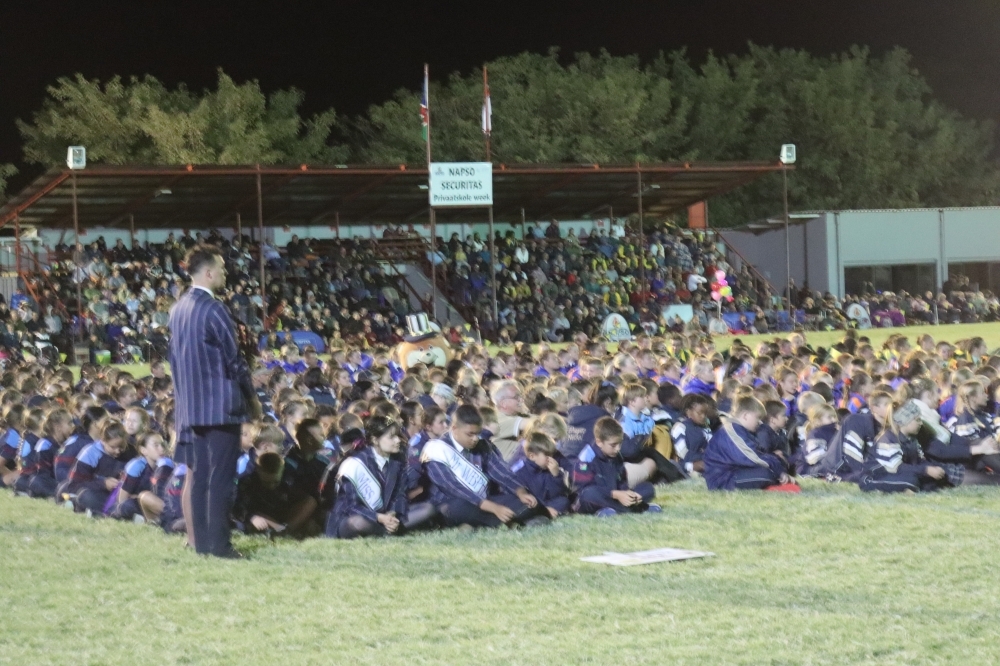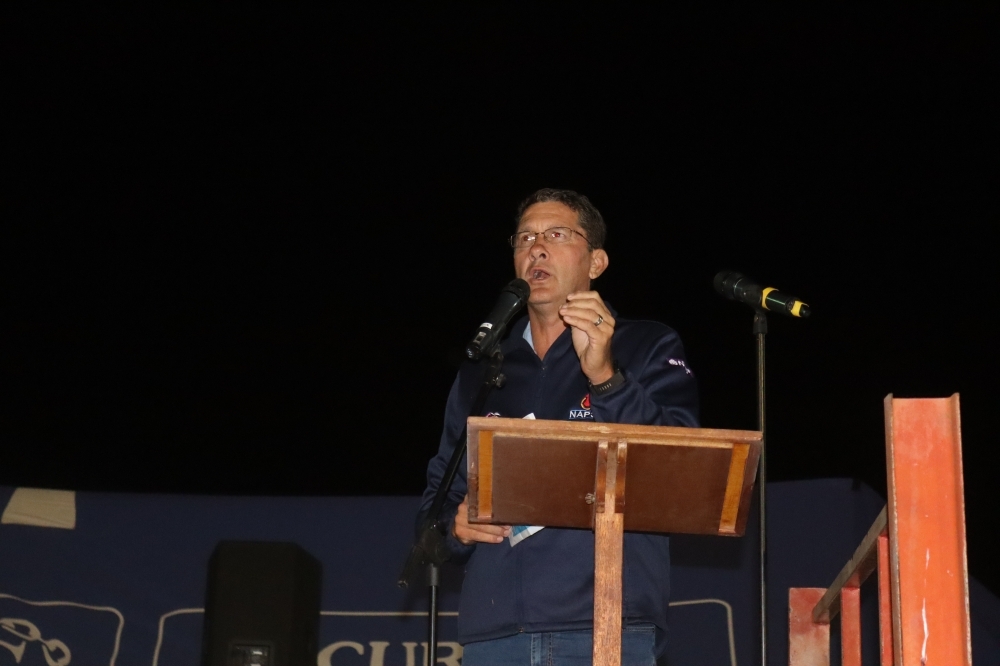Napso, NSSU in power battle
Namibia Schools Sports Union (NSSU) head Solomon Duiker says the union is not against private schools managing their own sports affairs, provided it is within the confines of the governing rules of school sports in Namibia.
His remarks come at a time when the future of thousands of learners at private schools hangs in the balance due to a power struggle between the Namibian Private Schools Organisation (Napso) and the NSSU.
Napso claims NSSU wants to see its instant demise. But Duiker is of the view that boardroom fights must be buried for the benefit of the Namibian child.
Napso currently has 21 affiliated private schools, with a collective learner population of over 5 400.
The organisation’s activities - which range from sports, academics and culture - are only open to member schools.
The two, through the High Court, this week reached an interim agreement for learners from schools under the private school organisation to be eligible for selection to represent the country - despite opposition from the NSSU, which said only athletes in its leagues should qualify.
This comes after the NSSU last month resolved that any player who does not take part in its rugby leagues will not be allowed to take part in the national schools’ rugby trials. The same goes for the netball super league.
Schools did not take the decision lightly, with some saying the move is unlawful and subsequently meant to kill the conglomerate of private schools under the Napso umbrella.
One of the disgruntled schools, Tsumeb Gymnasium, then approached the courts seeking recourse to have the NSSU decision rescinded.
Abuse of power
In court papers filed with the High Court, principal Pieter Niehaus accused NSSU boss Duiker of abusing his power to dictate to schools what they should and should not to do.
“Duiker and NSSU feel threatened by Napso and would like to see its demise,” the principal said.
Niehaus, who is also the CEO of Napso, alleged that Duiker abuses his position as national coordinator of NSSU to influence decisions “sought to coerce, threaten and intimidate Napso members and its learners, all with the aim of securing Napso’s demise”.
“The aforementioned decisions were made in violation of our client’s constitutional rights,” Niehaus’ court papers read.
According to him, Napso has been instrumental in sport development for its member schools.
He added: “Tsumeb Gymnasium and its learners are aggrieved by the biased, unreasonable and unfair conduct meted out against them by NSSU and particularly Duiker.
“Duiker has made it his mission to harass and threaten Napso members and its learners and he is using NSSU to achieve this goal,” Niehaus charged.
Agreement
An agreement has since been reached between the two parties for the NSSU to permit Tsumeb Gymnasium’s under-14 netball team to take part in the in the NSSU super league.
“The first respondent (NSSU) shall not exclude the applicant’s players based on non-participation in the first respondent’s regional leagues, subject to the applicant complying with its obligations in this order.
“The applicant shall enrol its under-14 netball team in the first respondent’s 2022 regional netball league,” Tuesday’s court order read.
NSSU has also been ordered to invite schools within the Tsumeb school zone to conclude a pool agreement with it by 30 May 2022. The aim of invitation is to secure enough players to enter the NSSU’s 2022 regional rugby leagues in respect of all age groups.
Threatening children
Meanwhile, Niehaus claimed NSSU has been intimidating learners of schools that are Napso members.
“In the past, Duiker and other officials of NSSU have tried to intimidate individual learners. The modus operandi was to target students who perform well in sports,” he said.
According to Niehaus: “The parents of those learners were then contacted and threatened that if that learner takes part in any Napso sporting event, or even appears on a photograph at a Napso event, that learner will never be allowed to play in any NSSU league or event ever again and will never be allowed to represent Namibia.”
In his answering papers, however, Duiker said Tsumeb Gymnasium “lacks standing for the relief” because “only regions, and not the schools, have standing to challenge the decision”.
He said the structure of NSSU does not permit schools to affiliate directly with the union, adding that “the schools would have to be part of a zonal demarcation in any of the regions that are affiliate members of NSSU”.
“The impugned decisions of NSSU are both fair and reasonable and are aimed at ensuring that all learners, irrespective of their background, gender, creed and social status, have equal opportunity to participate at national level,” he said.
Duiker charged that Napso and its members want special treatment.
“If I understand their complaint, they want to be granted automatic right to participate at national trials without having gone through the relevant structures at regional level. Allowing this would amount to discrimination and will be against the tenor of the NSSU and the Namibian Constitution and the principles of democracy,” Duiker said.
He added that the decision was not aimed at Napso, but rather at the regions who then communicated it to the affiliated schools.
“The application, contrary to the established structures of the NSSU, wants a wildcard to participate at the national rugby trials and the national schools Super League without going through the regional structures,” he said in court papers.
His remarks come at a time when the future of thousands of learners at private schools hangs in the balance due to a power struggle between the Namibian Private Schools Organisation (Napso) and the NSSU.
Napso claims NSSU wants to see its instant demise. But Duiker is of the view that boardroom fights must be buried for the benefit of the Namibian child.
Napso currently has 21 affiliated private schools, with a collective learner population of over 5 400.
The organisation’s activities - which range from sports, academics and culture - are only open to member schools.
The two, through the High Court, this week reached an interim agreement for learners from schools under the private school organisation to be eligible for selection to represent the country - despite opposition from the NSSU, which said only athletes in its leagues should qualify.
This comes after the NSSU last month resolved that any player who does not take part in its rugby leagues will not be allowed to take part in the national schools’ rugby trials. The same goes for the netball super league.
Schools did not take the decision lightly, with some saying the move is unlawful and subsequently meant to kill the conglomerate of private schools under the Napso umbrella.
One of the disgruntled schools, Tsumeb Gymnasium, then approached the courts seeking recourse to have the NSSU decision rescinded.
Abuse of power
In court papers filed with the High Court, principal Pieter Niehaus accused NSSU boss Duiker of abusing his power to dictate to schools what they should and should not to do.
“Duiker and NSSU feel threatened by Napso and would like to see its demise,” the principal said.
Niehaus, who is also the CEO of Napso, alleged that Duiker abuses his position as national coordinator of NSSU to influence decisions “sought to coerce, threaten and intimidate Napso members and its learners, all with the aim of securing Napso’s demise”.
“The aforementioned decisions were made in violation of our client’s constitutional rights,” Niehaus’ court papers read.
According to him, Napso has been instrumental in sport development for its member schools.
He added: “Tsumeb Gymnasium and its learners are aggrieved by the biased, unreasonable and unfair conduct meted out against them by NSSU and particularly Duiker.
“Duiker has made it his mission to harass and threaten Napso members and its learners and he is using NSSU to achieve this goal,” Niehaus charged.
Agreement
An agreement has since been reached between the two parties for the NSSU to permit Tsumeb Gymnasium’s under-14 netball team to take part in the in the NSSU super league.
“The first respondent (NSSU) shall not exclude the applicant’s players based on non-participation in the first respondent’s regional leagues, subject to the applicant complying with its obligations in this order.
“The applicant shall enrol its under-14 netball team in the first respondent’s 2022 regional netball league,” Tuesday’s court order read.
NSSU has also been ordered to invite schools within the Tsumeb school zone to conclude a pool agreement with it by 30 May 2022. The aim of invitation is to secure enough players to enter the NSSU’s 2022 regional rugby leagues in respect of all age groups.
Threatening children
Meanwhile, Niehaus claimed NSSU has been intimidating learners of schools that are Napso members.
“In the past, Duiker and other officials of NSSU have tried to intimidate individual learners. The modus operandi was to target students who perform well in sports,” he said.
According to Niehaus: “The parents of those learners were then contacted and threatened that if that learner takes part in any Napso sporting event, or even appears on a photograph at a Napso event, that learner will never be allowed to play in any NSSU league or event ever again and will never be allowed to represent Namibia.”
In his answering papers, however, Duiker said Tsumeb Gymnasium “lacks standing for the relief” because “only regions, and not the schools, have standing to challenge the decision”.
He said the structure of NSSU does not permit schools to affiliate directly with the union, adding that “the schools would have to be part of a zonal demarcation in any of the regions that are affiliate members of NSSU”.
“The impugned decisions of NSSU are both fair and reasonable and are aimed at ensuring that all learners, irrespective of their background, gender, creed and social status, have equal opportunity to participate at national level,” he said.
Duiker charged that Napso and its members want special treatment.
“If I understand their complaint, they want to be granted automatic right to participate at national trials without having gone through the relevant structures at regional level. Allowing this would amount to discrimination and will be against the tenor of the NSSU and the Namibian Constitution and the principles of democracy,” Duiker said.
He added that the decision was not aimed at Napso, but rather at the regions who then communicated it to the affiliated schools.
“The application, contrary to the established structures of the NSSU, wants a wildcard to participate at the national rugby trials and the national schools Super League without going through the regional structures,” he said in court papers.






Comments
Namibian Sun
No comments have been left on this article